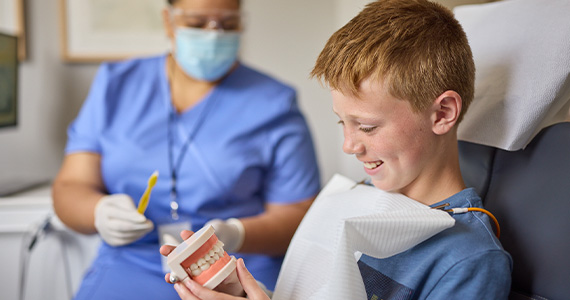Bad Breath in Children
Wondering why your child has bad breath?

Hello, Halitosis
Halitosis, the clinical term for bad breath is pretty common in adults—about one in four struggle with bad breath. Though this condition is not normally associated with children, halitosis can be common for them, too. Just like adults, there are many reasons why a child may have bad breath. Causes may include:
Food
We have all likely been concerned about our own onion or garlic breath at one point or another. It is no different for children. If you are lucky enough to have a child who enjoys a variety of vegetables and spices, you will likely find that their breath reflects their diet. A diet full of junk food and candy may also cause bad breath because the foods are often rich in carbohydrates or may be sticky, getting caught between teeth. This trapped, carbohydrate-rich food is a favorite for bacteria, multiplying as they consume the leftovers and causing a stink.
Poor Oral Hygiene
The most common cause of bad breath in both children and adults is poor oral hygiene. The bacteria that like to feast on the leftover food between teeth multiply and turn into a sticky substance called plaque. This plaque may eat away at tooth enamel, causing decay, or may harden to become tartar and contribute to gum disease. The bacteria can release a foul odor, so brushing properly at least twice a day to remove leftover food particles and plaque build-up is a good way to prevent bad breath.
Proper brushing technique can be difficult for younger children to master and test the patience of older children who would rather be doing something else. However, the proper brushing technique must be used in order to remove all of the built-up bacteria.
Have your child brush twice a day for two minutes and floss daily. Assist and supervise young children, when necessary.
Dry Mouth
Dry mouth is a decrease in the production of saliva, which helps to cleanse the mouth of odor-causing bacteria. It can occur due to a variety of reasons, but most commonly from mouth breathing or medications. Mouth breathing is common when children are stuffed-up with a cold or allergies. Certain medications, like antihistamines, can also cause dry mouth.
Treating Bad Breath
Once the cause of your child's bad breath is determined, you can take steps to help improve it. Without making fun or passing judgment, explain to your child that you have noticed their breath. Ask questions to determine the cause and take steps to improve it. Treatment may include slight diet changes, drinking water at night or, in the event of sinus infection, seeking treatment.
Regardless, your child should maintain a healthy oral hygiene routine and visit the dentist at least every six months for routine exams and cleanings. The professional removal of plaque and tartar will most likely improve their breath. However, if you are unable to determine the cause or improve your child's bad breath, discuss it with the dentist.
Infections and Illnesses
While tooth decay may cause halitosis, other oral conditions are also known to cause bad breath. These include:
- Mouth sores
- Tooth or gum infections
- Recent oral surgery
Less commonly known sinus and tonsil infections can also cause bad breath. This build-up of mucous, pus and other fluids containing bacteria can reside in the throat and nasal passages. If your child has recently experienced illness and bad breath, chances are the illness is to blame, so the halitosis should pass on its own.
Foreign Objects
It's common for younger children to stick objects up their nose, sometimes not even telling their parent. If these foreign objects become lodged in the nose for some time, it can cause bad breath. If you suspect your child has something lodged in their nose, contact their physician immediately to confirm and assist in safely removing the object.
Ultimately, everyone experiences bad breath at some point. However, it is especially important with children to:
- Help them establish effective brushing and flossing routines.
- Replace toothbrushes every few months to help with the effective removal of plaque and food debris.
- Be aware of and provide guidance on what they eat/drink.
- Identify and resolve symptoms of pain or illness.
- Schedule regular checkups, cleanings and any necessary follow up appointments at a dental office.
- Support the child emotionally by not making them feel badly about their bad breath.
- Work with them to address and solve the issue.
Note: The information in this document is not meant to replace the advice of your dentist or another licensed healthcare professional. Talk to your dentist for any specific dental advice.






